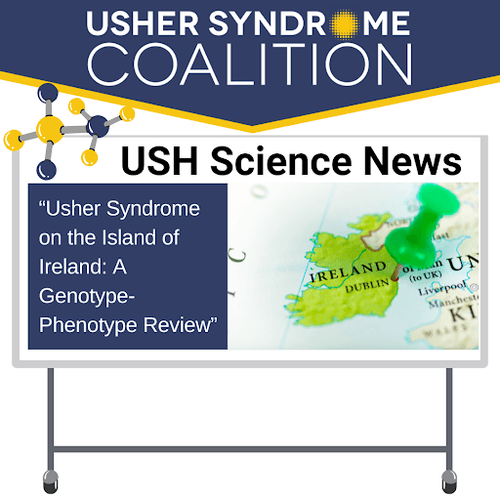Grounded in Science
A balance of research news and well-being for the Usher syndrome community.
USH Connections Conference | July 19-20, Rochester, NY + Online.
Hosted in partnership with the National Technical Institute for the Deaf.
There are only 40 days until our next conference! Who else is getting excited? We certainly are!
We are working hard with Rochester Institute of Technology (RIT) to find interpreters and CoNavigators for those who have requested them. As our community continues to rapidly grow, we anticipate needing an unprecedented number of conference interpreters. This requires us to widen our interpreter pool beyond Rochester.
We are reaching out to you, our USH community to ask for help. Will you donate to help cover the cost of interpreters coming from outside Rochester? We strongly believe in providing full access for everyone, and we can’t do it without your help!
Have you joined the Usher Syndrome Coalition Discord Community Server? It’s a safe place for the community to connect with each other. Join here: https://discord.gg/czwHGaDu7W
Research Spotlight
Odylia Therapeutics: Transforming Drug Development for Rare Disease
Odylia is a nonprofit biotech that supports rare diseases and drug development. It was initially formed with funding from the Usher 2020 Foundation and Mass Eye and Ear. The name Odylia is inspired by Odilia of Alsace, a patroness saint of good eyesight.
Many pharmaceutical companies overlook rare diseases with small patient populations due to the financial risk of bringing potential treatments to the clinic. This makes Odylia’s nonprofit model an innovative strategy, emphasizing the importance of patient benefit and overcoming the traditional investment barriers for rare disease drug development.
In a traditional research model, scientists conduct research to discover and understand potential treatments, but they do not typically work on the later stages of getting these treatments to patients, such as clinical trials and commercialization. Pharmaceutical companies aim to develop and market treatments but they may be hesitant to invest in early-stage research that is high-risk, especially if the treatment may only help a small number of people or if profitability is uncertain.
That’s where Odylia comes in. Odylia serves as a bridge between researchers and pharmaceutical companies. They help develop drugs and collaborate with academics and patient groups on their treatments. Their goal is to improve the likelihood of successful development and to facilitate partnerships with pharmaceutical companies to advance treatments to clinical trials. This model helps reduce the risks and challenges faced by researchers and pharmaceutical companies, potentially accelerating the development of new treatments and their availability to patients.
What this means for USH: As Usher syndrome is a rare disease, it has the potential of being overlooked by large biopharma companies who are concerned with profit margin. One of the projects currently in Odylia’s pipeline is for a gene therapy for an USH1C vision loss treatment.
Check out our Current USH Research page specific to USH subtype as well as gene-independent therapeutic approaches.
In Case You Missed It: Science News Feature
Usher Syndrome on the Island of Ireland: A Genotype-Phenotype Review
June 3, 2023: Researchers studied Usher syndrome in Ireland to better understand the phenotypic and genotypic characteristics in this population.
145 individuals were identified from an Irish Inherited Retinal Dystrophy registry. In this cohort, Usher type 2 was the most common, followed by type 1, then type 3, and a single case of type 4.
Genetic testing, vision, hearing, and balance tests were measured. Of those with positive genetic testing results (82.1%), the most common genes were USH2A (causes Usher syndrome type 2a) and MYO7A (causes Usher syndrome type 1b). From the vision testing, the researchers found that the retinitis pigmentosa was similar in all types of Usher, differing only by age of onset and rate of progression.
What this means for Usher syndrome: The similarity in the display of retinitis pigmentosa between all types of Usher syndrome in this cohort suggests that there is potential for gene-agnostic therapies that may benefit all types of Usher. Additionally, the distribution of genotypes in this study could be used to inform future clinical trials.
For more science news, check out our Science News page, organized by treatment approach and type of Usher syndrome.
DISCLAIMER: The Usher Syndrome Coalition does not provide medical advice nor promote treatment methods. USH Science News is intended to help summarize more complex literature for the community to use at their own discretion.
ON WELL-BEING: Movement
Hopefully, you are aware of the benefits of movement - how exercise is good for staying healthy, good for mental health, building community and self-esteem (Caretti et al. 2022). Maybe you feel limited, or unsure about how to make community sports or going to the gym more “Usher syndrome friendly.”...
USH Life Hack of the Month
(Send your USH life hacks to info@usher-syndrome.org.)
One member in the community had the unique idea to put a glow collar, made up of glow sticks, on their black dog when letting them outside for potty breaks at night to help with visibility!








